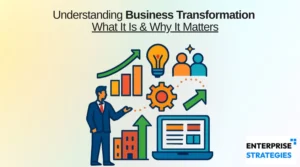Scaling a business beyond its current plateau demands more than just adding headcount or technology—it requires fundamentally rethinking how work gets done. Enterprise transformation consulting brings structured approaches that break through growth barriers by aligning strategy, operations, technology, and talent. Organizations partnering with experienced consultants report up to 2× greater value realization on transformation investments, according to KPMG’s enterprise transformation research. This advantage comes from consultants’ ability to build tailored roadmaps, establish governance, and accelerate capability development across the organization.
Why Scaling Businesses Need Transformation Support
The statistics tell a sobering story: 48 percent of digital transformation initiatives fail to meet their goals, most commonly because they overemphasize technology while neglecting people and processes. Meanwhile, Gartner’s transformation research shows that enterprises enlisting dedicated transformation services are more than twice as likely to successfully scale their operations compared to those navigating change alone.
Scale-up challenges that typically trigger the need for enterprise transformation services include:
- Operational bottlenecks that weren’t problematic at smaller size suddenly threaten growth
- Decision-making slowdowns as management layers increase and spans of control widen
- Technology limitations where systems that worked for a mid-sized company buckle under enterprise-scale demands
- Cultural fragmentation when rapid hiring dilutes the founding vision and operating principles
- Market expansion complexities that introduce new regulatory, competitive, and operational variables
As McKinsey’s scaling research demonstrates, these challenges require both strategic recalibration and execution discipline—precisely what transformation consultants provide.
Core Enterprise Transformation Services for Scale-Ups
Strategic Roadmapping for Sustained Growth
Effective enterprise transformation consulting begins with developing a structured roadmap that segments initiatives into logical phases:
- Foundation-building efforts that stabilize core operations
- Acceleration initiatives that remove immediate scale constraints
- Transformation programs that fundamentally reimagine business capabilities
This phased approach prevents the common scaling trap of trying to fix everything simultaneously, which typically leads to execution paralysis. Deloitte’s enterprise performance research shows that organizations with clear transformation sequences achieve 60% higher success rates than those pursuing multiple initiatives without prioritization.
Operating Model Evolution
As organizations scale, their operating models must evolve from entrepreneurial to enterprise-grade. Transformation consultants help redesign:
- Organizational structures that balance specialized expertise with cross-functional collaboration
- Decision frameworks that push authority to appropriate levels while maintaining alignment
- Performance systems that connect individual contributions to company-wide goals
- Governance mechanisms that ensure accountability without bureaucratic drag
Forbes’ analysis of scaling organizations demonstrates that operating model redesign represents the single most important factor in successful scaling, accounting for nearly 40% of performance variance between successful and unsuccessful growth companies.
Technology Platform Modernization
Scaling businesses often outgrow their initial technology stack. Enterprise transformation services help build scalable platforms through:
- Technology architecture assessment to identify scaling limitations
- Cloud migration strategies that enhance flexibility and reduce technical debt
- API and integration roadmaps that connect disparate systems
- Data strategy development that turns information into competitive advantage
According to Business Insider’s technology scaling research, organizations that proactively modernize their technology foundations during growth phases achieve 2.5× better scaling economics than those forced into reactive technology replacement.
Process Standardization and Optimization
Growth often creates process inconsistency as different teams develop their own ways of working. Transformation consultants help:
- Document and standardize core processes across the enterprise
- Identify and eliminate bottlenecks that constrain scale
- Implement automation where it delivers maximum value
- Establish process ownership and continuous improvement mechanisms
McKinsey’s process standardization studies reveal that scaling businesses with standardized core processes grow 30% faster than competitors with fragmented approaches.
Talent and Change Management
Scaling requires both capability building and cultural reinforcement. Enterprise transformation consulting addresses these through:
- Leadership development programs tailored to scaling challenges
- Change readiness assessment and intervention planning
- Capability building that addresses critical skill gaps
- Cultural alignment initiatives that preserve core values during rapid growth
The importance of this dimension cannot be overstated. Prosci’s change management research shows that scaling organizations with structured change management are 6× more likely to achieve their growth objectives than those focusing solely on technical implementation.
Measurable Impact on Scaling Performance
Well-executed enterprise transformation services deliver concrete results for scaling businesses:
- 20-35% reduction in operating costs through standardization and automation
- 30-50% faster time-to-market for new products and services
- 15-25% improvement in employee productivity through streamlined processes and better tools
- 40-60% reduction in system outages and performance issues
These improvements translate directly to financial performance. According to Enterprise Strategies client data, organizations that implement comprehensive transformation programs during scaling phases achieve 2.3× higher revenue growth rates and 1.8× better profit margins compared to industry peers.
Selecting the Right Transformation Partner
For scaling businesses, the right consulting partner can mean the difference between successful growth and stalled momentum. Look for providers that demonstrate:
- Scaling-specific methodologies tailored to growth-stage challenges
- Cross-functional expertise spanning strategy, operations, technology, and people
- Implementation focus rather than just strategic recommendations
- Flexible resourcing models that adapt to your evolving needs
- Knowledge transfer commitment to build internal capabilities
Ask potential partners for case studies specifically related to companies at your growth stage. According to Third Stage Consulting’s transformation research, the fit between a company’s scaling challenges and consultant experience is the strongest predictor of transformation success.
Common Scaling Transformation Pitfalls
| Scaling Pitfall | How Transformation Consulting Helps |
|---|---|
| Premature complexity | Implement right-sized processes and systems for current scale with room to grow |
| Capability gaps | Identify and address critical skill shortages before they constrain growth |
| Cultural dilution | Embed core values and behaviors into new operating models |
| Decision bottlenecks | Design governance that balances control with empowerment |
| Technical debt accumulation | Develop technology roadmaps that support both immediate needs and long-term scale |
Bain’s work with scaling organizations shows that addressing these pitfalls proactively through structured transformation approaches increases successful scaling probability by 3.5×.
Transformation Partnership Models for Different Growth Stages
Different scaling phases require different consulting approaches:
Early Scale-Up Phase
- Advisory partnerships focusing on strategic direction and foundational capability building
- Targeted interventions addressing specific growth constraints
- Part-time expertise supplementing internal teams
Mid-Scale Phase
- Program management for coordinated transformation initiatives
- Process standardization across expanding operations
- Technology modernization to support increasing complexity
Enterprise Scale Phase
- End-to-end transformation aligning all organizational dimensions
- Advanced capability development in specialized functions
- Ecosystem integration with partners and suppliers
According to KPMG’s scaling research, matching the transformation partnership model to your specific growth stage increases success rates by 40% compared to one-size-fits-all approaches.
Building Internal Transformation Capabilities
The ultimate goal of enterprise transformation consulting should be to build self-sufficiency. Effective consultants:
- Transfer methodologies through side-by-side working
- Coach internal leaders to drive ongoing change
- Establish transformation governance that outlasts the engagement
- Develop metrics to track transformation progress
Deloitte’s capability building research indicates that organizations that build internal transformation capabilities during consulting engagements sustain benefits 2.7× longer than those that remain dependent on external expertise.
Taking the Next Step
Ready to explore how enterprise transformation services can accelerate your scaling journey? Consider these practical next steps:
- Conduct an honest assessment of your current scaling constraints
- Identify the transformation dimensions most critical to your growth
- Evaluate potential consulting partners against your specific needs
- Start with a focused engagement to build mutual understanding before committing to enterprise-wide transformation
Email contact@enterprisestrategies.com with subject “Scaling Assessment” to receive our diagnostic tool that benchmarks your organization against successful scaling companies and identifies priority transformation areas.




